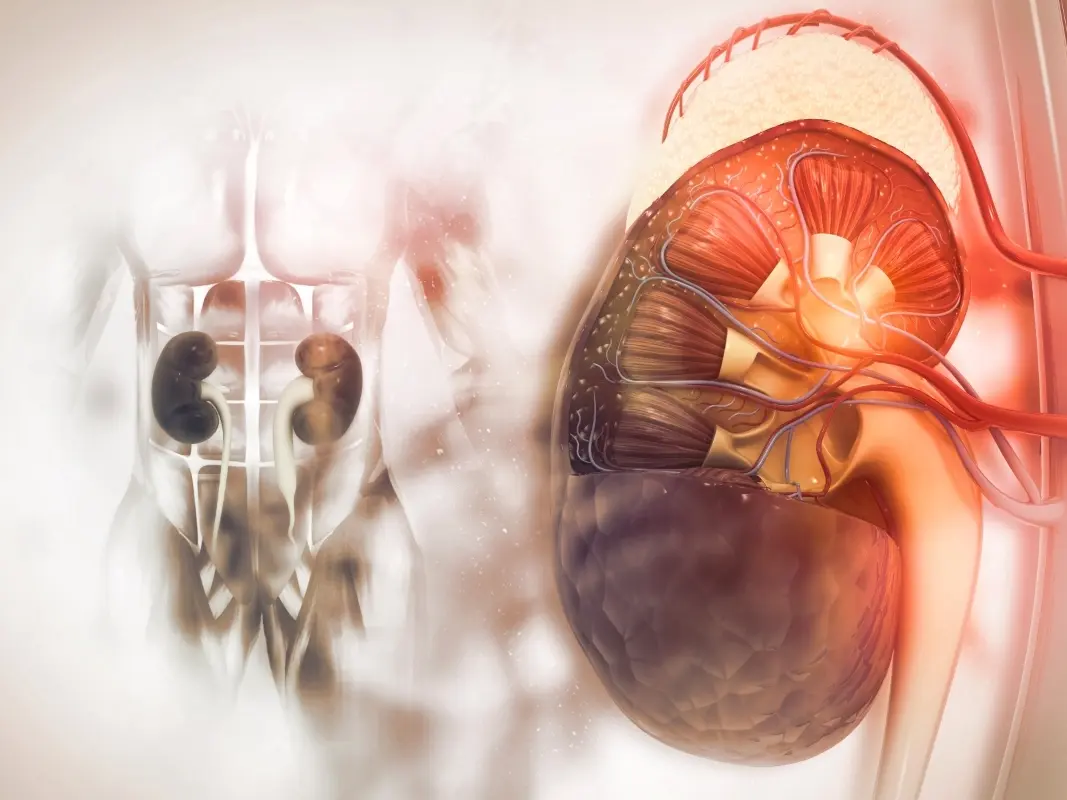What Is Kidney Cancer?
The kidneys are two bean-shaped organs in the human body that are responsible for the filtration of blood. These are located behind the abdominal organs with one kidney on each side of the spine. The nephrotic system inside the kidneys ensures that the useful nutrients and salts are retained in the body while the toxins are released out of the body. The waste products are produced in the form of urine or stools.
Kidney cancer occurs when any of the cells forming the kidneys start growing uncontrollably and soon form a mass called a tumour. Cancer in any part of the body occurs when changes occur in the functioning of the cells lining or forming the kidneys. Cancer is classified as either benign or malignant. Benign cancer cells operate or adhere to one area of the body, whereas malignant cancer cells have the ability to spread to other areas of the body. This movement is known as metastasis.
Book Consultation
What Causes Kidney Cancer?
The causes of kidney cancer need to be understood first to determine the correct cancer ayurvedic medicines to be utilised in the treatment
- The exact cause of kidney cancer is not known by medical specialists. Usually, the cell’s DNA is responsible for what happens inside the cell. The modifications or mutations in the DNA interfere with the cell’s normal functioning and lead to the division of the cells.
- The additional factors that might contribute to the malfunctioning of kidney cells are old age and poor lifestyle habits like smoking. It is most commonly observed in the age group 65 and 74.
- People who deal with obesity and high blood pressure issues are more likely to develop the risk of kidney cancer.
- For those receiving dialysis for a long time, the chances of getting kidney cancer are higher. Also, if the patient has been receiving radiation treatments to treat cancer-related to reproductive organs or any nearby areas, the situation of developing kidney cancer may arise.
- If there is a family history of kidney cancer, you may develop it. People with lymphoma are also known to be at risk of dealing with kidney cancer.
Types of Kidney Cancer
The various types of kidney cancer are stated below:
- Renal Cell Carcinoma
Being the most common form of kidney cancer, it begins in the tubules connected to the kidney and the rest of the body. These tubules are responsible for carrying the useful nutrients and fluid back to the body. It occurs in the form of a single tumour and develops from the cells lining the tubules.
- Transitional Cell Cancer
This type of cancer occurs in the region of the renal pelvis. It is the area where the ureter connects with the kidney. Occurring in ureters or bladders, this type of cancer accounts for 6% to 7% of total kidney cancers.
- Wilms Tumour
Wilms Tumour is usually observed in children and young adults. It is generally identified at the time of birth and is mostly curable. The patient might be experiencing swelling or the formation of a lump in the related area.
- Renal Sarcoma
Renal sarcoma begins in the connective tissue present in the kidneys. Renal sarcoma is not common and accounts for 1% of kidney cancers. If not treated on time, it can spread to other parts of the body as well.
Stages of Kidney Cancer
The degree of immunity and the patient's general health determine the course of treatment. In addition, the physician will do diagnostic procedures to determine the disease's complexity. On the basis of that, the stages and prognosis are determined.
The stages of kidney cancer are as follows:
- Stage 1
At this stage, the tumour measures 7cm or small and is restricted to the kidney itself.
- Stage 2
At stage 2, the tumour measures more than 7 cm and is still in the kidney. No movement is observed in the lymph nodes.
- Stage 3
During stage 3, cancer spreads to surrounding major blood vessels. It includes the tissue surrounding the kidneys, renal vein, or inferior vena cava. The nearby and related lymph nodes may also be affected.
- Stage 4
This is the last stage of kidney cancer where the cancer cells reach other parts of the body and are also likely to affect the adrenal gland located on top of the kidney. The distant lymph nodes may get affected at this stage.
End stage renal disease ayurvedic treatment can also be carried out to alleviate the symptoms and promote healing.
Signs and Symptoms of Kidney Cancer
Following are the symptoms of kidney cancer that must be diagnosed closely. This will help in providing you with the correct ayurvedic medicine for cancer prevention.
- The patient experiences pain on either side of the lower back. Tiredness, and a constant sense of being sick and uncomfortable.
- Blood may appear in the urine, also called hematuria. Formation of mass in the kidney area may also be observed.
- Other symptoms include weight loss, loss of appetite, low-grade fever, high blood pressure, high levels of calcium, and bone pain.
- Anaemia and inflammation in the legs are also possible. If cancer cells have already spread to other areas, there could be coughing up blood and shortness of breath.

What Could Be The Possible Complications?
- The possible complications of kidney cancer have been listed below.
- Hypertension (high blood pressure)
- There is too much calcium in the blood.
- Red blood cell count is elevated.
- The cancer has spread.
Why should you trust Karma Ayurveda?
Being one of the oldest systems of medicine, it incorporates a lot of hypotheses and concepts that have been received in the modern age. It holds the ability to reduce the symptoms and issues that a particular disease is causing. Panchakarma for cancer carried out by professionals ensures that the use of medicinal herbs and therapies is done in a proper manner.
This traditional system of medicine believes that any kind of disease or disorder is developed in the body when there is an imbalance or stress in the consciousness of a person. Ayurvedic medicines for cancer treatment and formulations work directly on the root cause of the health problem. It helps to regain a balance between the mind and body and energises the soul.
Ayurveda steadily recognises the cellular systems and universe in a slow-healing approach. The techniques of Karma Ayurveda are distinct from those of modern medicine. The treatment is straightforward and hassle free. If anything, it revitalises the body and guarantees that a person remains fit and healthy.
- Expert Assistance
- 100% Natural Treatment
- Ayurvedic Solutions

